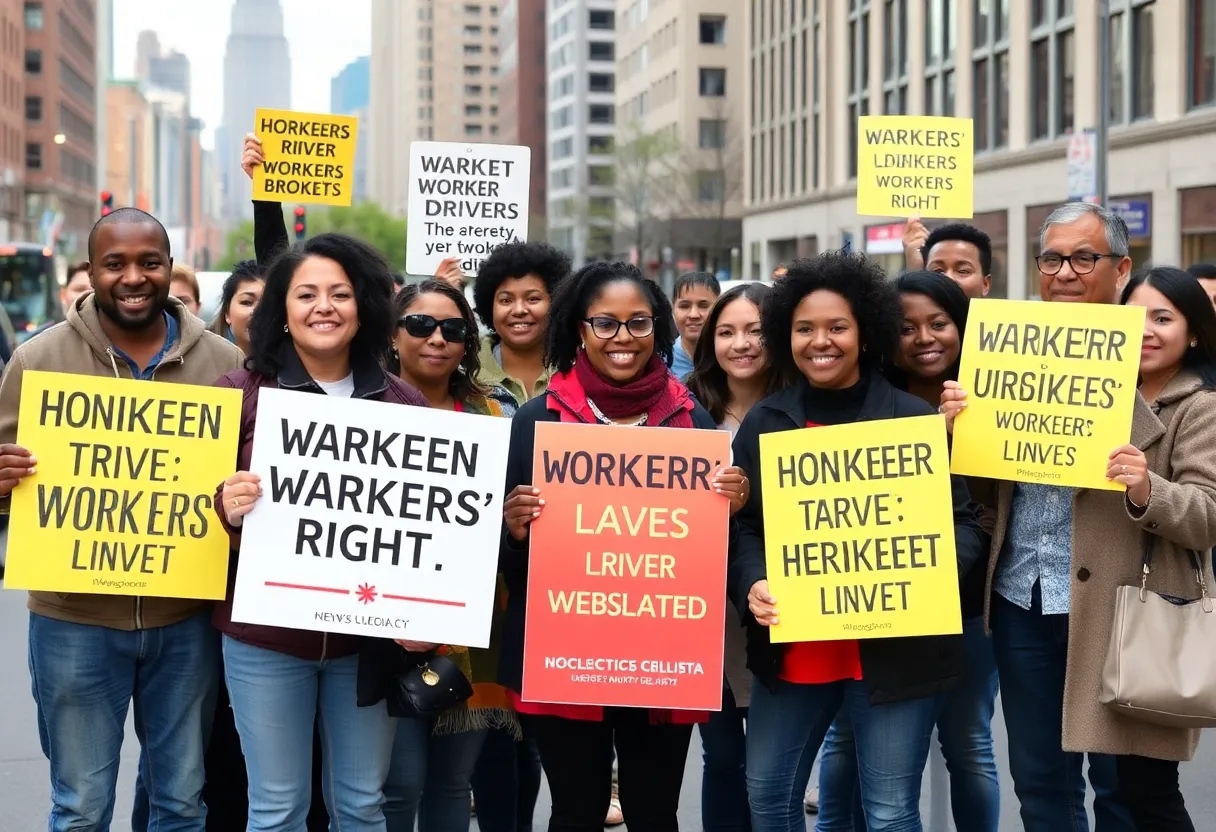California, October 5, 2025
News Summary
California has passed Assembly Bill 1340, allowing rideshare drivers to unionize while preserving their independent contractor status. Signed into law by Governor Gavin Newsom, this legislation affects over 800,000 drivers. It requires rideshare companies to negotiate with unions formed by drivers, marking a significant shift in the gig economy landscape. However, concerns remain regarding the law’s effectiveness and its limited scope, as it excludes other gig workers. This legislative move aims to improve bargaining rights and protections for rideshare drivers amidst ongoing debates about worker rights and gig economy regulations.
California has taken a significant step in the gig economy by passing Assembly Bill 1340, which allows rideshare drivers to form unions while retaining their status as independent contractors. Governor Gavin Newsom signed the legislation into law, impacting over 800,000 rideshare drivers across the state. This law mandates app-based transportation companies, including major players like Lyft and Uber, to negotiate in good faith with the newly-formed unions.
This landmark legislation is viewed as one of the largest expansions of private sector collective bargaining rights in California’s history. The bill is a compromise between labor unions, particularly the Service Employees International Union (SEIU), and gig economy companies after years of political and legal disputes over drivers’ classification. However, it’s important to note that this law does not extend to other gig workers such as food delivery drivers for apps like DoorDash.
To form a union under AB1340, rideshare drivers must gather signatures from at least 10% of active drivers. If 30% of drivers sign up, they can petition for union certification, leading to an election if multiple organizations seek to represent them. The term “active” drivers refers to those who have completed a median number of rides in the last six months.
Alongside the unionization rights, the law is set to reduce insurance requirements for rideshare companies. The mandatory coverage for accidents involving underinsured drivers will drop from $1 million to $60,000 per individual and $300,000 per accident.
While many express optimism about the potential benefits of the new law, including improved bargaining rights for pay and protections, some drivers have voiced concerns about algorithmic changes impacting their earnings during negotiations. Furthermore, there are worries that the legislation may result in a “union-in-name-only” scenario without guaranteeing meaningful negotiations or protections for drivers.
Driver advocacy group Rideshare Drivers United has raised alarms that the collective bargaining law might not be robust enough to ensure fair contracts. Critics also highlight that the law does not guarantee necessary worker protections during collective actions, such as strikes, nor does it require companies to disclose wage data.
This legislative effort reflects an ongoing dialogue about workers’ rights within the gig economy, highlighting the need for better safety measures and pay for rideshare drivers. While some lawmakers deem this compromise a step forward for empowering drivers, it remains a contentious issue among labor advocates, who argue that the framework may ultimately favor corporations at the expense of worker rights.
As rideshare drivers face unique challenges in organizing due to their non-traditional work environments—lacking designated meeting places—the new law aims to provide a structured approach for collective bargaining, a crucial consideration in this evolving landscape of gig-based employment.
FAQ
What does Assembly Bill 1340 allow California rideshare drivers to do?
The law allows rideshare drivers to form unions and negotiate contracts while retaining their status as independent contractors.
How many rideshare drivers will benefit from this law?
Over 800,000 rideshare drivers in California will benefit from the new unionization rights.
What is required for rideshare drivers to form a union under the new law?
Drivers need signatures from at least 10% of active drivers to petition for union representation.
Does the legislation extend to other gig workers?
No, the law does not extend to other gig workers, such as food delivery drivers working for apps like DoorDash.
What changes to insurance requirements does the law introduce?
The law reduces coverage for accidents involving underinsured drivers from $1 million to $60,000 per individual and $300,000 per accident.
Key Features of AB1340
| Feature | Description |
|---|---|
| Union Formation | Allows rideshare drivers to form unions and negotiate contracts. |
| Active Drivers | Minimum of 10% signatures required to petition for union representation. |
| Insurance Changes | Reduces coverage for underinsured accidents from $1 million to $60,000 per individual and $300,000 per accident. |
| Excluded Workers | Does not extend to other gig workers such as food delivery drivers. |
Deeper Dive: News & Info About This Topic
- CBS News
- Los Angeles Times
- AP News
- Politico
- Governing
- Wikipedia: Gig Economy
- Google Search: California rideshare unionization
- Google Scholar: California rideshare unionization
- Encyclopedia Britannica: Gig Economy
- Google News: California rideshare unionization

Author: STAFF HERE HOLLYWOOD
The Hollywood Staff Writer represents the experienced team at HEREHollywood.com, your go-to source for actionable local news and information in Hollywood, Los Angeles County, and beyond. Specializing in "news you can use," we cover essential topics like product reviews for personal and business needs, local business directories, politics, real estate trends, neighborhood insights, and state news affecting the area—with deep expertise drawn from years of dedicated reporting and strong community input, including local press releases and business updates. We deliver top reporting on high-value events such as the Hollywood Bowl summer concerts, the Hollywood Christmas Parade, film premieres at TCL Chinese Theatre, and festivals at the Magic Castle. Our coverage extends to key organizations like the Hollywood Chamber of Commerce and Visit Hollywood, plus leading businesses in entertainment, dining, and tourism that define the local economy. As part of the broader HERE network, including HERELosAngeles.com, HEREBeverlyHills.com, HEREAnaheim.com, and HEREHuntingtonBeach.com, we provide comprehensive, credible insights into Southern California's dynamic landscape.



